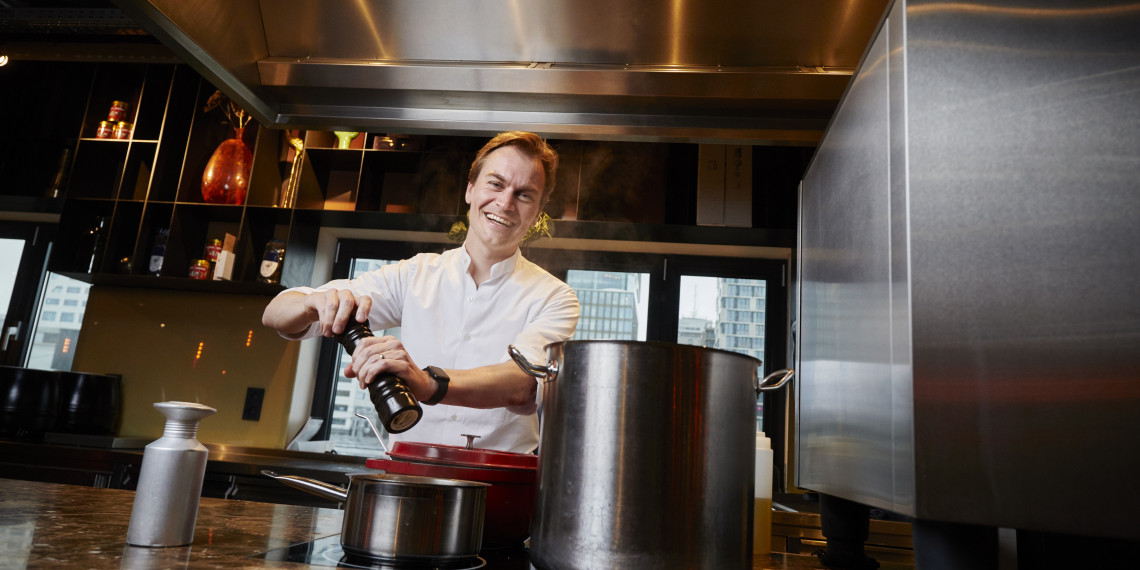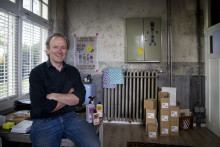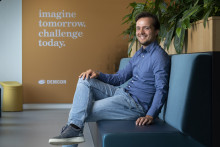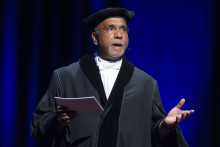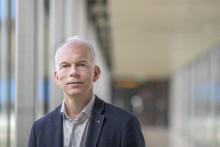If you want to understand UT alumnus Tim van de Rijdt, just search for the ‘Shirtless Dancing Guy’ video on YouTube. The video shows a man dancing at a festival, a bit silly and all by himself. Until, after a few awkward seconds, a second festival-goer starts dancing along. He then calls his friends over to join them and before long, a whole crowd is partying to the music. But how is this translated into the business world? In this case, the ‘Shirtless Dancing Guy’ is an entrepreneur or inventor with a plan that – at first glance – seems insane, until someone else comes along who believes in the story and starts ‘dancing along’.
Van de Rijdt does not think of himself as the first shirtless festival-goer, but rather as the second dancer. This is exactly the role he fulfils at Dutch company Mosa Meat. In 2013, professor Mark Post and food expert Peter Verstrate succeeded in creating the first cultured meat burger. Food critics who got to taste the burger live on television found it quite tasty, but a bit dry (because the meat does not contain much fat yet). When Van de Rijdt heard about the project, he was immediately enthusiastic. ‘I offered to help. I did so for a year and a half, from the train and in the evenings, alongside my regular job.’
Cultured meat
Van de Rijdt has now been working at Mosa Meat for many years. The Limburg-based company uses one minuscule piece of meat from a live cow to make a hamburger via cell multiplication. This means it is real meat, but no animals have to be slaughtered to make it. In recent years, an entire industry has emerged in this ‘cellular agriculture’, producing meat, fish and leather. Currently, the main challenge is to produce high-quality meat, on a large scale and at a reasonable price, explains the alumnus. Mind you, the cost of the first piece of cultured meat in 2013 was 250 thousand euros.
On top of that, Mosa Meat’s product should have the smallest possible ecological footprint, because that is potentially the greatest advantage of ‘cellular agriculture’ compared to traditional animal husbandry. ‘There are negative climate consequences associated with our current animal husbandry,’ Van de Rijdt points out. ‘We might start eating less meat in the Netherlands because of plant-based alternatives, but worldwide meat consumption is still growing. This is because meat consumption is directly correlated with wealth increase.’
'At the UT, I developed an interest in everything digital'
Petri dish
Compared to slaughtered beef, cultured beef requires 95 percent less agricultural land, generates 93 percent less air pollution and uses 78 percent less water, figures from research firm CE Delft show. An additional benefit: consumers can continue to eat meat. ‘With our technology, we’re not counting on any mass consumer behavioural change; not everyone will become vegan of their own free will. That’s why Mosa Meat makes the same meat, but in a sustainable way.’
But how to turn this into a commercial success? Therein lies a major task for CMO (Chief Marketing Officer) Van de Rijdt. His job is threefold. ‘First, I look at where we can offer our meat. At this stage, we’re not allowed to sell our burgers just anywhere; even tasting them is a sensitive issue in the Netherlands. I also maintain contact with potential buyers, such as supermarket chains or restaurant chefs, i.e. the ‘sales side’. Finally, I try to draw attention to the product and define the image. Of course, we want to present our meat in such a way that it makes your mouth water. The image of a professor cultivating meat in a petri dish in some obscure laboratory somewhere is not accurate. The place where we produce the meat is more like a brewery.’
Twente
Van de Rijdt learnt his first skills in communication and marketing in Enschede. In 2000, he arrived at the Twente campus to study Applied Communication Science (TCW). ‘I’m a true generalist at heart and was thrilled to have found a broad programme in TCW. Plus, the campus was great; a kind of Center Parcs where I could also study.’ Van de Rijdt was, in his own words, an ‘academic late bloomer’. ‘It was only at the end of my studies that I realised that science allows you to add something to what we already know. That’s when the penny dropped for me.’
Even more important was his meeting with Neil van der Veer, founder of Newcom. The research company was part of the TCW programme back then, and specialised in online research, rather than paper surveys. Many TCW students were able to find work at the thriving Newcom. ‘After my studies, I spent a few years working as a project leader at Newcom, which by then had evolved into a commercial company. I had a great time working at a young company with all these enthusiastic and ambitious people.’
'Consumer behaviour is not changing fast enough and governments are slow to act'
Although Van de Rijdt was not looking for another job, a new opportunity presented itself in 2008. ‘It actually started at the UT, which had one of the fastest networks in the world during my years as a student. As a result, I developed an interest in everything digital. Purely out of interest, I searched for some information on Google’s data centres around 2008. I found out that Google has a commercial office in Amsterdam. Because of my fascination with the company, I decided to apply there. All I could do was hope for the best, but after a seven-month application process, in the middle of the credit crisis, I got the job.’
Van de Rijdt took on various roles within Google, eventually focusing on consumer marketing. ‘The people who make it are the core of the company. I found it interesting to form a bridge between the market’s needs and the engineers. When it comes to product requirements, there are major differences between countries. A good example is the situation in the Netherlands, where people place great value on public transport and cycling. Other countries are more car-oriented. We were the first country in the world to be able to incorporate all current public transport information on departure and arrival times in Google Maps, to meet the specific needs of the Dutch market.’
The UT alumnus felt right at home working at Google, but as time passed, he felt the urge to pay more attention to ‘what the world needs’. Van de Rijdt firmly believes in using technological solutions to tackle major social problems, such as climate change. With Mosa Meat, it is all about sustainable meat. ‘But the movement is much broader than that. Consumer behaviour is not changing fast enough and governments are slow to act. This new movement, call it ‘hacking capitalism’, is aimed at solving problems independently of the authorities and consumer behaviour by means of technology. This development is desperately needed, which is why I started dancing along at Mosa Meat.’



